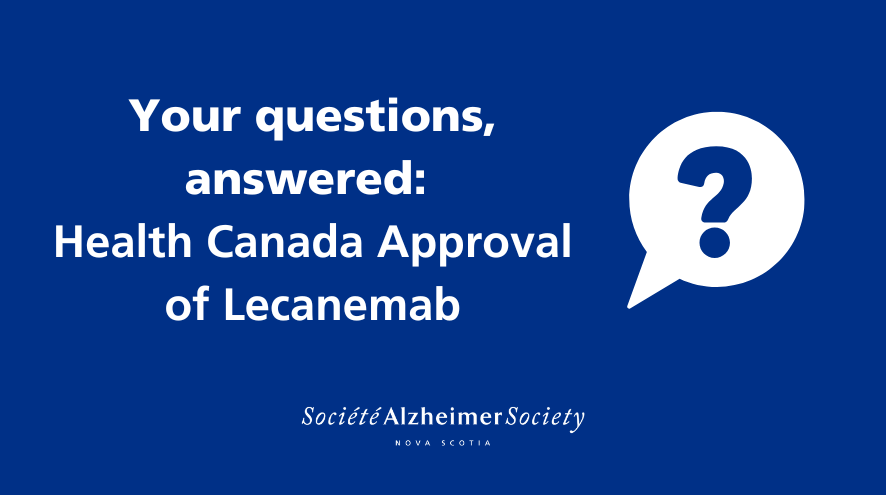Your questions, answered: Health Canada Approval of Lecanemab
We're answering your questions about the Health Canada approval of lecanemab.

Thank you to everyone who submitted questions about lecanemab on our recent message from our CEO on the Health Canada approval of lecanemab.
It will take some time for our healthcare system to figure out how or if to prescribe this new drug, as it requires genetic screening, regular MRI monitoring and must be administered intravenously in a clinical setting.
We’ll answer your questions as best we can with the information currently available. Some questions below may be paraphrased to combine similar questions, for clarity and for anonymity.
My husband was diagnosed with MCI several years ago. He has NOT progressed into Dementia or Alzheimer’s, yet. With that said, his short-term memory is quite bad. Might Lecanemab be something that would help him?
Mild cognitive impairment is a qualifying diagnosis for this drug, and it may provide modest benefits. Additional screening and genetic testing with his physician will be needed to determine if he is a candidate.
If a person was diagnosed with moderate to progressive Alzheimer's would this patient qualify?
The drug is only approved for mild cognitive impairment or early-stage Alzheimer’s disease. It is not approved for use in those who have progressed past early-stage Alzheimer’s disease.
My husband was in a study and given a trial drug by infusion which was having great results for him. This office in New Minas, NS was shut down, and we were left in limbo. How would we access this new drug when it becomes available?
You would need to consult with your husband’s doctor to determine if he would be a candidate.
When will the drug be available in Nova Scotia?
We do not currently have a date of availability in Nova Scotia.
Why will there be a requirement for genetic testing in Canada but not in other countries?
The European Union and the United Kingdom have the same requirement, and in the United States includes a boxed warning strongly recommending genetic screening. In other approved countries, restrictions will be based on regional health systems and protocols.
Research shows that carriers of two copies of the APOE4 genetic variant (homozygotes) face a much higher risk of brain swelling and small brain bleeds when taking the medication than carriers of one copy (heterozygotes) or non-carriers.
Where can I get tested for APOE4?
Specialists are working on determining how and where this test will be available. A referral from your doctor will be needed.
How will people in rural areas access the genetic testing?
Similar to above, specialists are working on determining how and where this test will be available. We don’t currently know where it will be available.
If Lecanemab is approved for use in Nova Scotia, would testing from reputable sources outside of Canada be considered in the qualification process (i.e. APOE4 gene)? Please discuss what you know about Provincial willingness to fund that testing.
At this time, we do not know if testing from outside of Canada will be accepted or if the province will fund the testing.
Can I go to the United States and receive the treatment?
We can’t advise on how to access this treatment in the United States as each healthcare centre would have different processes.
What is the mechanism by which this new drug works?
The drug works by clearing beta-amyloid proteins from the brain. The buildup of these proteins has been linked to brain cell death and is one sign of Alzheimer’s disease.
What does "disease-modifying" treatment really mean? How would this new drug help people with Alzheimer's?
Disease-modifying treatments target the underlying biology of a disease. In the case of lecanemab, it targets beta-amyloid proteins in the brain. Previous drugs approved for the treatment of dementia were for symptom management.
